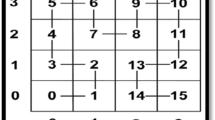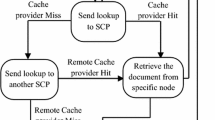Abstract
With an evolution of Internet and related technologies such as 4G, and 5G, there is a need of fast response time for various queries raised by intermediate nodes and mobile terminals from infra structured-based/less networks. Although there has been many efforts in the past to address this issue by using an invalidation report (IR)-based cache management schemes which reduce the bandwidth requirements, and battery consumptions, but when the update rate of data at the server is high, then most of the existing approaches have long query latency due to large and fixed size of IRs, and broadcast time (BT) interval. To address these issues, in this paper, an adaptive cache invalidation technique (ACIT) is proposed. In comparison to the previous approaches, the proposed scheme uses different thresholds update rates for adaptive IR, and BT intervals. In the proposed scheme, only hot data updates in IR are recorded which results a less query delay, and bandwidth consumption. The performance of the proposed scheme was studied by extensive simulations by comparing it with the other state-of-the-art schemes using various metrics. The proposed scheme yields 1.5 times enhancement in query response time with a reduction in IR size to 25 % in comparison to other existing techniques. Moreover, there is a reduction of 119.89 % in broadcast time interval using the proposed scheme.













Similar content being viewed by others
References
Li, Y., & Chen, I. (2011). Adaptive per-user per-object cache consistency management for mobile data access in wireless mesh networks. Journal of Parallel and Distributed Computing, 71(2), 1034–1046.
Newman, M. (2003). The structure and function of complex networks. SIAM Review, 45(1), 167–256.
Sutton, C. (2008). Internet began 35 years ago at ucla with first message ever sent between two computers. Los Angeles: UCLA.
Schacham, N. & Westcott, J. (1987). Future directions in packet radio architectures and protocols. In: Proceedings of the IEEE, 75(1), 83–99.
Diacui, C., & Berkenbroc, M. (2008). Supporting cache coherence. In: Mobile cooperative system: Seventh IEEE international symposium on network computing and applications (pp. 240–243).
Chuang, J.P., & Chiu, Y. (2008) Constructing efficient cache invalidation schemes for mobile environments. In: Third international IEEE conference on signal-image technology and internet based system (pp. 281–288).
Barbara, D., & Imielinksi, T. (1994). Sleepers and workaholics: Caching strategies for mobile environments. ACM SIGMOD, 23, 1–12.
Cao, G. (2000). A scalable low-latency cache invalidation strategy for mobile environments. ACM MOBICOM, 200–209.
Safa, H., Aartail, H., & Nahhas, M. (2010). A cache invalidation strategy for mobile networks. Journal of Network and Computer Applications, 33(2), 168–182.
Khurana, S., Kahol, A., Gupta, S., & Srimani, P. (2000). A strategy to manage cache consistency. In: A distributed mobile wireless environment. IEEE international conference on distributed computing systems (ICDCS).
Cao, G., & Dar, C. (2001). On the effectiveness of a counter-based cache lnvdidation scheme and its resiliency to failures in mobile environments. In: Proceeding of 20th IEEE symposium on reliable distributed system (SRDS) (pp. 247–256).
Cao, G. (2002). On improving the performance of cache invalidation in mobile environments. Mobile Networks and Applications (MONET), 7(4), 291–303.
Kumar, N., & Lee, J. H. (2014). Peer-to-Peer cooperative caching for data dissemination in Urban vehicular communications. IEEE Systems Journal. doi:10.1109/JSYST.2013.2285611.
Tiwari, R., & Kumar, N. (2012). A novel hybrid approach for web caching. In: Proceeding of IMIS 2012 (pp. 512–517). Palermo.
Wu, C.-C., Fang, J.-F., & Hung, P.-C. (2003). A counter-based cache invalidation scheme for mobile environment with stateless servers. In: IEEE Pacific Rim conference on communications, computers and signal processing PACRIM.
Jing, J., Elmagarmid, A., Helal, A., & Alonso, A. (1997). Bit sequences: An adaptive cache invalidation method in mobile/server environments. Mobile Networks and Applications, 2(2), 115–127.
Cai, J., & Tan, K. L. (1999). Energy efficient selective cache invalidation. Wireless Networks, 5(6), 489–502.
Cai, T., & Ooi, H. (2001). An evaluation of cache invalidation strategies in wireless environments. IEEE Transactions On Parallel & Distributed Systems, 12(8), 789–807.
Chand, N., Joshi, R. C., & Misra, M. (2005). Energy efficient invalidation in mobile environment. Journal of Digital Information Management, 3(2), 119–125.
Joseph, M.S., Kumar, M., Shen, H., & Das, S. K. (2005). Energy efficient data retrieval & caching in mobile P2P network. In: International conference on pervasive computing & communications workshops (pp. 50–54).
Chin, C., Fie, J., & Chun, P. (2009). A counter based cache invalidation scheme for mobile environments with stateless servers. Communications, Computer & Signal Processing, 2, 623–626.
Wu, C. C., Fang, J, & Hung C. P. (2003). A counter-based cache invalidation scheme for mobile environments with stateless servers. In: IEEE Pacific Rim conferences on communications, computers and signal processing (pp. 623–626).
Safa, H., & Aartail, H. (2008). COACS: A cooperative and adaptive caching system for MANETs. IEEE Transactions on Mobile Computing, 7(8), 951–977.
Chuang, P., & Chiu, Y. (2011). Efficient cache invalidation schemes for mobile data accesses. Information Sciences, 181, 5084–5101.
Fatima, N., & Khader, P. (2011). Enhanced adaptive cache invalidation approach for mobile environments. In: 3rd IEEE international conference on electronic computer technology (ICECT) (pp. 76–80).
Lim, S., Lee, S., Soha, M., & Lee, B. (2013). Energy-aware optimal cache consistency level for mobile devices. Information Sciences, 230(5), 94–105.
Paul, P., & Saravanan, N. (2013). Efficient service cache management in mobile P2P networks. Future Generation Computer Systems, 29(6), 1505–1521.
Nguyen, T., & Dong, T. (2010). An efficient cache invalidation system in mobile information systems. In: IEEE international conference on computing and communication technology, research, innovation, and vision for future (RIVF) (pp. 1–4).
Paul, P., Saravanan, N., Baskaran, R., & Dhavachelvan, P. (2013). Efficient service cache management in mobile P2P networks. Future Generation Computer Systems, 29(6), 1505–1521.
Chan, E., Li, W., & Chen, D. (2009). Energy saving strategies for cooperative cache replacement in mobile ad hoc networks. Pervasive and Mobile Computing, 5(1), 77–92.
Sunho, L., Chansu, Y., & Das, C. R. (2012). Cache invalidation strategies for internet-based vehicular ad hoc networks. Computer Communications, 35, 380–391.
Cao, G., Yin, L., & Das, L. C. (2004). Cooperative cache based data access in ad-hoc networks. Computer, 37(2), 32–39.
Shen, H., Joseph, M. S., Kumar, M., & Das, S. (2005). A scheme for cooperative caching in mobile Peer to Peer network. IEEE international parllel & distributed processing symposium (pp. 57–64).
Chan, E., & Liw, L. (2012). Movement prediction based cooperative caching for location dependent information service in mobile adhoc network. Journal of Supercomputing, 59(1), 297–322.
Yin, L., & Cao, G. (2006). Supporting cooperative caching in ad hoc networks. IEEE Transaction on Mobile Computing, 5(1), 77–89.
Kumar, P., Chauhan, N., Awasthi, L., & Chand, N. (2010). Proactive approach for cooperative caching in mobile adhoc networks. International Journal of Computer Science, 7(8), 21–27.
Mrmol, F., & Prez, G. (2012). TRIP: A trust and reputation infrastructure-based proposal for vehicular ad hoc networks. Journal of Network and Computer Application, 35(3), 934–941.
Dubey, A., & Sharma, S. (2011). A cache invalidation scheme through data classification in IVANET. International Journal of Computer Application, 25(9), 54–57.
Wang, Y., & Li, F. (2005). Vehicular ad hoc networks. chapter 20, 503–525.
Ahmadifard, N., Nabizadeh, H., & Abbaspour, M. (2014). ISEFF: An id-based scalable and efficient distributed file shaing technique in vehicular ad hoc networks. Wireless Personal Communications, 75(2), 821–841.
NS2 simulator, http://www.insi.edu/nsnam/ns (2008)
Issariyakul, T., & Hossain, E. (2011). Introduction to network simulator NS2. Berlin: Springer.
Lim, S., Lee, W., Cao, G., & Das, C. R. (2006). A novel caching scheme for improving Internetbased mobile ad hoc networks performance. Ad Hoc Networks, 4(2), 225–239.
Acknowledgments
We are thankful to all the anonymous reviewers for their valuable suggestions and comments which improves the overall content, quality, and presentation of the paper.
Author information
Authors and Affiliations
Corresponding author
Rights and permissions
About this article
Cite this article
Tiwari, R., Kumar, N. An adaptive cache invalidation technique for wireless environments. Telecommun Syst 62, 149–165 (2016). https://doi.org/10.1007/s11235-015-0070-1
Published:
Issue Date:
DOI: https://doi.org/10.1007/s11235-015-0070-1




